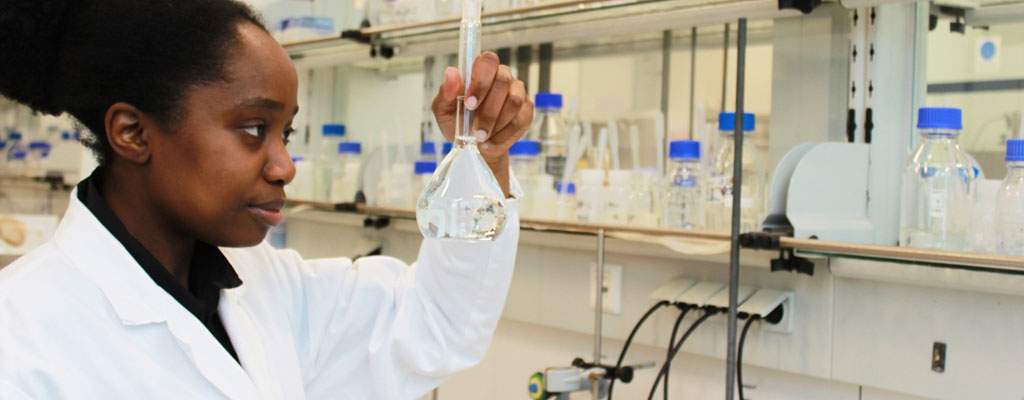Medicine? Yes! Engineering? Yes! But chemistry? Better not
Interview with Lisa Tichagwa, Intern, Education Sub Saharan Africa (ESSA)
 Photo:
Jacobs University
Photo:
Jacobs University
Medicine? Yes! Engineering? Yes! But chemistry? Better not. "When people in Zimbabwe say that they want to study chemistry, most people ask: ‘What will you do with it?’ ", tells Lisa Tichagwa. "They normally suggest other subjects."
The 21-year-old nevertheless decided to study chemistry at Jacobs University Bremen. Now she has been awarded the August Wilhelm von Hofmann scholarship of the German Chemical Society (GDCh) for her outstanding academic achievements - and she feels satisfied with her choice. "The scholarship shows me that I made the right decision."
This does not only apply to the subject area, but also to the university. She came across Jacobs University while researching possible places to study on the internet. "The study program, the interdisciplinarity and the fact that English is spoken on campus was appealing and eventually convinced me." She applied without speaking a word of German and without having been to Germany before.
After successful admission, Lisa Tichagwa arrived in Bremen at the end of January 2017. It was a cold day and when she reached campus, it was almost dark. The feeling of being lost did not last long, though. "From the very beginning I got on well with my roommate in the dormitory. The intercultural workshop for newcomers, in which I took part, also made me feel at home very quickly."
Living and studying together with students from many different nationalities on campus also proved to be helpful for her integration. The students at Jacobs University live in four dormitories on the 34-hectare campus. "You have the feeling that everyone knows everyone," Lisa says. There are no boundaries between the nationalities and the individual age groups, whether you are in your first or third year makes no difference. "Everyone is approachable, including the professors, which is very helpful indeed."
Ulrich Kortz, Professor of Chemistry, had proposed Lisa for the scholarship, named after August Wilhelm von Hofmann, the founding president of the initial German Chemical Society. In addition to her regular studies, Lisa has been involved in Kortz's research group where the focus is on the synthesis of novel inorganic functional materials. "Lisa is an exceptionally gifted student, the best of her year", says Kortz.
Working in a laboratory, combining theory and practice and being able to work hands-on is what Lisa appreciates most. It is a privilege to be able to do research so early in her studies, she says. The Zimbabwean is also involved in the Student Chemistry Society of Jacobs University. In the annual MINTInternational Workshop, a cooperation of Jacobs University with the Massachusetts Institute of Technology (MIT), she taught her subject to high school students from the Bremen region.
However, her life does not just revolve around chemistry. Equal educational opportunities for all, regardless of their origin, is a topic she has been interested in ever since she completed an internship at ESSA. This organization aims to improve educational standards in sub-Saharan Africa, networking actors in the education sector and trying to achieve better access to knowledge about education in Africa. She is also keen on environmental issues, and to relax, she simply picks up a piece of paper and folds origami.
Lisa Tichagwa will graduate next year. The next step is also already clear to her: she wants to follow up with a Master degree and then a PhD in chemistry, of course.
This article is part of the series “Faces of Jacobs”, in which Jacobs University introduces students, alumni, professors, staff members and friends of Jacobs University. https://www.jacobs-university.de/faces